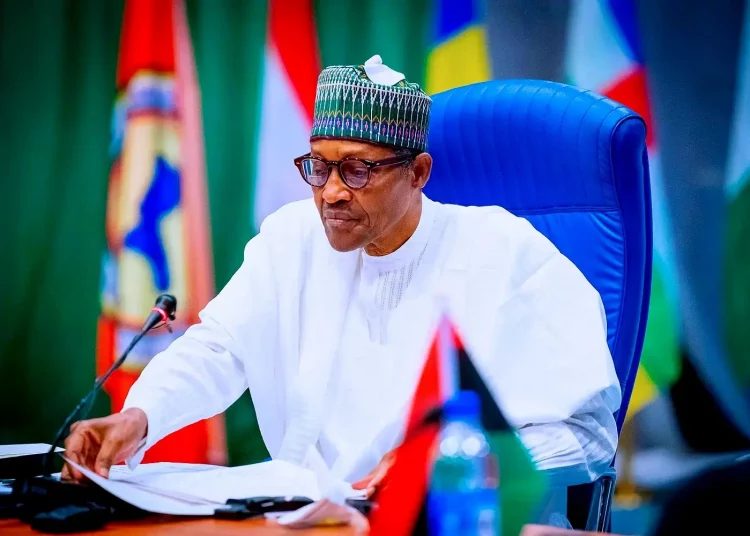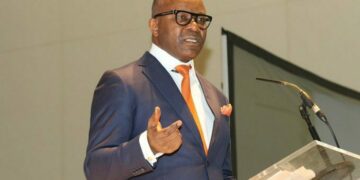The European Union(EU) has advocated for a sustainable development of a vibrant Nigerian economy which must be the new way the country should conduct its business going forward.
Ambassador of the European Union(EU) to Nigeria and ECOWAS, Ms. Samuela Isopi, while speaking at the 8th Edition of EU-Nigeria Business Forum themed: ‘Nigeria and the New Economy,’ in Victoria Island, Lagos, at the weekend,
said, countries that have been struggling to recover from Covid-19 pandemic now face further challenges to food and nutrition security, energy, commodities prices and public finances, even as unprovoked Russia!s invasion of Ukraine have directly generated negative impacts on global economy of which Nigeria is not immune.
In Nigeria, she said, the shockwaves are already being felt on fuel, fertilizers and food prices as this has a disproportionate effects on the most vulnerable.
The way forward, according to her, has to be the sustainable development of a vibrant diversified economy, based on a business environment that is attractive to investors.
“Nigeria’s new economy is about finding a path through difficult terrain, identifying opportunities and offering a business-friendly approach. Nigeria has great potentials in new fields of endeavour, but the new economy is also about putting forward innovative, modern solutions to established sectors,” she pointed out.
Stressing that the EU remains the largest Investor in Nigeria and the number one trade partner, accounting for 20 per cent of the Nigeria’s trade with the world, she added that, despite the global downturn in trade that is still being felt after Covid-19, EU-Nigeria trade in 2021 was €28.7 billion with a significant trade balance of over €6 billion in favour of Nigeria.
“Of course, the oil and gas sector dominates both experts and import and the trade figures will change significantly, when the Dangote refinery comes fully online. Nevertheless, it does highlight a long-lasting concern, namely, the country’s dependency on oil and the ever-increasing need to diversify,” she said.
Similarly, the minister of State, for Finance, Budget and National Planning, Prince Clem Agba, called for further diversification in other critical sectors such as agriculture, oil and gas, culture and tourism to truly explore the full potentials in those sectors, which, he said, could be revenue spinner for the country going forward.
According to him, “Nigeria also has renewable energy opportunities. Integrated rural development is critical to reduce the current urban migration. The rural areas should be provided with several amenities needed for people to be productive their, hence, will not need to migrate to cities that are already crowded. Mini grids need to be in rural areas to attract investors into these areas.”
Stating that the country’s export business is mainly driven by primary products which literarily translates to exporting jobs, he said, this is not good for the economy.
“We need complexity in our products export such that we can produce and export finished goods to retain jobs in country. There is already a plan to move 100 million Nigerians out of poverty in the next 10 years,” he pointed out.
Meanwhile, Lagos state governor, Babajide Sanwo-Olu, stated that Nigeria needs to transit to a new economy, driven by diversification in its entirety, adding that this can be done by exploring a mutually benefiting relationship between EU and the Nigeria.
Covid-19, Russsia-Ukraine war, among others, he said, brought fundamental lessons to learn, and now, the country must be committed and pragmatic in addressing the business dynamic to favour a productive economy, and less dependent on export.
“There is the opportunities to increase gas export to Europe, backward integration and agriculture must be pursued with commitment to enhance food supply, productive economy and less dependent on import. This will lead to job and wealth creation,” he pointed out.
Stressing that Lagos is committed to 2052 development agenda and a framework is already in the works for this, he added that, the primary focus is for Lagos to be leading formal retail trade state, West Africa wholesale Hub, Export hub for fast moving consumer goods and to be the biggest food market in the country.
Earlier, the president, the European Business Chamber (the EuroCham), Mary Ojulari said, the success of the relationship between the EU and Nigeria trade ties, can be attributed to the resilience and recognition of the roles that both parties play as major economic markets. EU member states, she said, are putting action to words, and have committed to undertake projects in Nigeria to the tune of 950 million Euros.
“I must commend the efforts of both the EU and Nigerian communities in building and fostering stronger ties. The EU is a significant trading partner of Nigeria and as such, the engagement between EU companies and Nigerian entities is crucial to maintaining the strong trade relations between the EU and Nigeria,” she said.
EuroCham Nigeria, she added, actively promotes trade, investments, and exchanges between European and Nigerian businesses, whilst advocating for the adoption of European quality standards, best practices, and a culture of corporate social responsibility.
“The foundational principle of the economic relationships between the EU and Nigeria is that the two continue to forge cooperation that is mutually beneficial and that we dwell on complementing each other to achieve prosperity for all parties involved,” she stated.





